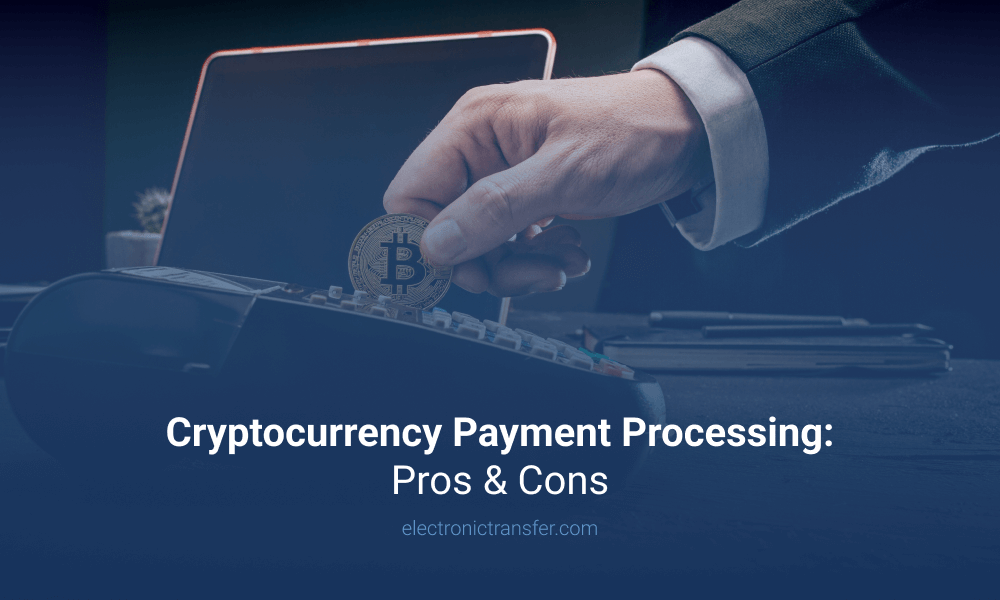Cryptocurrency Payment Processing: Pros & Cons

As more people start using cryptocurrency instead of regular money, businesses need to understand it better. This is especially important for high risk businesses as they often face challenges with traditional payment methods, such as high fees and increased risk of fraud. By adding crypto they can benefit from faster transactions, lower fees, and enhanced security, which can improve their overall financial stability and customer satisfaction.
This article will explain cryptocurrencies, how cryptocurrency payment processing works, the pros and cons, and whether your business should start accepting it as well Keep reading.
What Is Crypto?
Crypto, short for cryptocurrency, is a type of digital decentralized money. It is based on a technology called blockchain, which securely keeps track of all transactions.
Some popular examples include:
- Bitcoin (BTC): The pioneer and most well-known cryptocurrency.
- Altcoins: These are alternative coins like Ethereum (ETH), Ripple (XRP), and Litecoin (LTC).
- Stablecoins: These are tied to real-world assets like USD or gold to reduce volatility.
- Utility Tokens: These are used within specific platforms or ecosystems.
- Security Tokens: These tokens represent ownership in an asset or company.
People use crypto as a form of investment or a way to shop. A growing trend is the integration of crypto payments into e-commerce platforms, moreover some physical stores are also starting to accept cryptocurrencies.
What Is Cryptocurrency Payment Processing?
Cryptocurrency payment processing works like this:
- When a customer buys something online, instead of using a credit card, they pay with Bitcoin.
- The transaction goes throughblockchain, which is a secure and transparent ledger, to make sure it’s valid.
- The merchant Is then paid in cryptocurrency or their local currency like USD.
Cryptocurrency payment gateways convert the received crypto into regular money instantly and deposits it into the merchant’s bank account, finishing the transaction.
Cryptocurrency Payment Gateway
This is quite simply as a bridge between merchants and customers who use cryptocurrencies . When the customer pays Using a cryptocurrency, the payment gateway instantly converts the received payment into fiat currency. These funds are added to the merchant’s account and at predefined intervals (as per your service contract), they are deposited into adesignated bank account.
Some examples of crypto payment gateways include CoinsPaid, Coinbase Commerce, BitPay, NOWPayments that suit various business needs.
Is It Legal to Accept Cryptocurrency?
Many business owners are concerned about whether accepting crypto is legal. In the U.S., businesses are permitted to accept digital coins as a form of payment. Regulatory bodies such as the Financial Crimes Enforcement Network (FinCEN), the Securities and Exchange Commission (SEC), and the Commodity Futures Trading Commission (CFTC) oversee cryptocurrency regulations.
For tax purposes, cryptocurrency is recognized as property. Merchants report it as gross income based on its fair market value at the time of receipt. This means receiving Bitcoin or any other cryptocurrency is treated like other property transactions.
Once a cryptocurrency payment is completed, it is irreversible. This feature helps with cash flow management since there are no chargebacks. However, it also means that refunds can only be initiated by the recipient of the funds.
Cryptocurrency Payment Processing: Pros & Cons
Let’s explore the advantages and difficulties linked to this new payment method.
Benefits of Cryptocurrency Payment Processing:
- Wider customer reach: It enables businesses to reach a wider global market without the hassle of currency conversions, expanding their potential customer base.
- Quicker transactions: Transactions are direct and do not involve banks or intermediaries, making payments faster and more efficient.
- Financial independence: Cryptocurrency users have more control over their assets, reducing their dependence on traditional banking systems and promoting financial autonomy.
- Financial access: Cryptocurrencies can often offer financial services to unbanked populations, allowing them to participate in the global economy.
- Industry transformation: Along with blockchain technology, crypto has the potential to transform industries with cross-border transactions and supply chain management, thus streamlining processes and reducing costs compared to traditional payment methods.
Challenges and Limitations of Cryptocurrency Payment Processing:
- Market volatility: Cryptocurrencies are known for their price fluctuations which can impact businesses and holders of cryptocurrency alike..
- Regulatory uncertainty:Regulations vary globally, making it somewhat challenging to have a standard that everyone follows..
- Technical challenges: Integrating cryptocurrency payment systems requires technical expertise and investment in resources for smooth and secure transactions.
- Security concerns: While blockchain technology is secure, external threats like wallet security and phishing attacks pose risks to cryptocurrency users, necessitating prioritized security measures.
Tips for High Risk Business Owners Considering Cryptocurrency Payment Solutions
Navigating the realm of cryptocurrency payment solutions can be complex, but with the right guidance and knowledge, you can enhance your payment options.
Understanding the Regulatory Landscape
It is important for both you and your business to have a good understanding of cryptocurrencies and any requirements they entail legally.
Prioritizing Security Measures
Security should be a top priority for high risk businesses when dealing with cryptocurrency. Some important measures to take are:
Preparing for Price Fluctuations
Cryptocurrencies are notoriously volatile assets. Consider implementing risk management strategies to mitigate the impact of these fluctuations on your business operations and financial stability.
Payment Gateways for Cryptocurrency
Look for and choose a reputable cryptocurrency payment gateways that align with your business requirements and risk tolerance levels. This is crucial for facilitating secure and efficient crypto transactions within your business operations.
Educating Your Customers
Educating your customers about cryptocurrency payments is key to fostering trust and adoption. Provide clear instructions on how to use cryptocurrencies for transactions, and be prepared to address any concerns they may have.
Wrap Up
While cryptocurrency is a fascinating field, keep in mind that they are still evolving. Stay informed and weigh the pros and cons of such a payment process so you can successfully leverage the full potential of this technology. For further guidance and solutions, feel free to contact Electronic Transfer Inc. to learn more.


